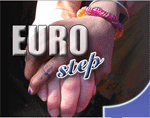Eurostep: Transforming for a Changing Agenda
Published on Thu, 2013-11-21 12:40
For the past two decades Eurostep and its membership have worked towards equal opportunities and justice between North and South – hence the name. A lot has been achieved in calling for socially just and inclusive EU policies, especially in regard to developing countries. But the global and European contexts have fundamentally changed since 1990 and so have civil society organisations. Against this backdrop and in order to adapt to these changes, the current membership has made the decision to change Eurostep’s structure, membership and purpose. Eurostep is embarking on a process of transition towards being defined more clearly within Social Watch. When Eurostep was established in 1990 by the heads of 20 European NGOs involved in development it was with the conviction that nationally based organisations within Europe needed to work more closely together to influence the policies and practice of Europe’s engagement with developing countries. There was a shared commitment to promote equal opportunities and justice between North and South and as the name implies a European Solidarity Towards the Equal Participation of People. For the past two decades Eurostep and its membership have worked towards this end. It has been a key actor in promoting poverty focused, socially just and inclusive approaches in the EU’s development policy and practice. It has been at the forefront of initiatives that have had a significant impact on development policy, including the promotion of quantative time bound targets that significantly shaped the MDGs, the strengthening of the legal basis for development in the EU’s treaties, and the establishment of the EU’s Development Cooperation Instrument. This has only been possible through the commitment of Eurostep and its membership to pursue such objectives in collaboration with others, and in particular with civil society actors from all parts of the world, not least from so called developing countries. Such collaboration has been established on the basis of a partnership between equals, and in the context of Eurostep, has been associated with the establishment of a number of civil society networks, including Social Watch, the South Asia Alliance for Poverty Eradication and LDC Watch. Eurostep has worked closely with these networks since their inception, providing a window on the EU. The context for Eurostep today is considerably different to that of the time in which it was established. The European Union and indeed the World has changed fundamentally. While twenty years is a cmparatively short time, there have been significant changes over those two decades. The capacity of civil society to engage in policy debate has grown exponentially, including towards the European agenda. > Just as important, the policy framework for development at European and global level has also changed. Today’s relationships between nations in different parts of the world are not the same as they were in 1990. The dominance of the global economy by the donor countries is increasingly challenged by the growing economic power of others. The demand for limited natural resources which are seen as necessary for competing economic activity has become a critical issue. The concept of countries categorised as developed and developing, which has been the basis of development policy, no longer holds as it once did. The membership of Eurostep has concluded that this is the moment to take stock of its achievements and to adapt to the changes outlined above. To this end, its members have decided to change the structure, purpose and membership of the organisation. The principles and values that underpin Eurostep’s approaches to the EU’s relations outside Europe must relate to how these principles and values are pursued within the Union. The future contribution that Eurostep can make as an actor in Europe rests more in building synergies with its collaborating partners inside and outside the Union – focused on that consistency of approach - rather than as a European development NGO network focused on the impact of EU policy and practice on developing countries alone. Eurostep is therefore embarking on a process of transition towards being defined more clearly within Social Watch. Source: EUROSTEP. » |




